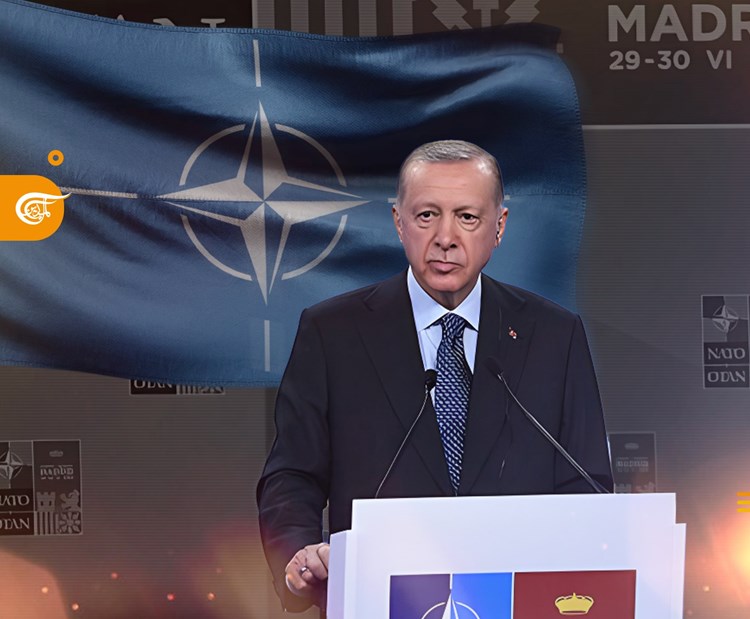As Turkey draws closer to Brussels, US, and NATO, how will this affect reconciliation with Syria?
Ankara will likely be more considerate of the West's considerations and priorities and more eager to coordinate its positions with them regarding the dossiers of the Syrian crisis unless unforeseen circumstances arise from the shifting sands of the region.
Dmitry Peskov was reluctant to confirm Turkish President Recep Tayyip Erdogan's claims that Russian President Vladimir Putin will be visiting Ankara next month.
The Kremlin Press Secretary did not deny the news of the visit but stated that no fixed date has been set for it yet. Perhaps Peskov is right not to disclose the exact date of the visit. Perhaps he wants to send a message of admonition or anger to the Turkish presidency following recent stances it has taken that were not well received by Moscow. Turkish-Russian relations are likely not at their best at present, but it is also likely that the visit will proceed regardless of the timetable. The interests and complex considerations shared by the two countries are far greater than their differences.
Moscow has made no secret of its ire at Turkey's enthusiasm for NATO's expansion, which it views as a serious threat to its national security and an attempt to encircle it and encroach on its strategic depth. The Turkish President has displayed blatant enthusiasm for NATO's expansion, especially since winning the recent presidential elections. He withdrew his veto against Sweden's membership bid after green-lighting Finland's admission on the grounds that the alliance has the "right" to admit new members and that candidate states have a right to take "sovereign" decisions. Moscow and Ankara are on opposite sides when it comes to NATO's eastward expansion toward the borders of the Russian Federation.
However, Ukraine's membership bid is the greatest source of the Russians' concern and frustration with President Erdogan. He welcomed the step, stating that Kiev deserves to join, in a departure from the positions of major, leading NATO powers. The US, the UK, and Germany, for example, are inclined to postpone the matter until the fighting stops on the Ukrainian-Russian front, preferring to offer alternatives and guarantees outside the framework of the alliance and its charter. Although some discount Erdogan's remarks as excessive flattery of his guest, Ukrainian President Volodymyr Zelensky, they have struck a sensitive chord with the Kremlin – especially since its special military operation was launched as a preemptive reaction to attempts to expand NATO to include Ukraine and deal a heavy blow to Russian security.
In any case, with the conclusion of the NATO summit in the Lithuanian capital, we can now say that an additional grace period has been bought to deal with and contain the repercussions of Russian-Turkish disagreement over the alliance's expansion and Ukraine joining its ranks. However, a crack has undoubtedly appeared in the wall of trust between the two men. Zelensky aggravated the situation by proudly releasing photos of himself posing with ultra-nationalist Azov Brigade commanders aboard a plane returning to his country. Moscow had released the commanders to Ankara as part of a prisoner exchange deal, on the condition that they be kept in Turkish custody until the end of the war, but Erdogan broke his promise and released them to Russia's number one enemy without notice or warning, according to Peskov.
Indeed, Moscow does not view these events as isolated incidents or spectacles for the media's consumption. Rather, it believes them to be part of Turkey's U-turn toward the West, Washington, NATO, and Brussels, which has accelerated since Erdogan snatched a difficult victory in the presidential elections. Turkish relations are rapidly advancing toward a deal to procure F-16s and sanctions relief. Erdogan has offered his decision to facilitate Sweden's accession to NATO as a "down payment" on a pathway toward Turkey joining the EU. He is urging President Biden to help him overcome and remove the obstacles that have prevented it from joining in the past and may block it again in the future.
Russia made no secret of its preference for Erdogan to return to power in the recent elections. It was very enthusiastic about stimulating the Syrian-Turkish reconciliation process and arranging a summit between Erdogan and President Al-Assad before the elections in the hopes of improving his electoral chances by advancing the Syrian refugee repatriation dossier, which was a hot-button issue during the election campaigns alongside the earthquake and the crisis of the Turkish lira. Moscow's enthusiasm for Erdogan and his party to return to power in the competition against the pro-NATO opposition drove the latter to accuse the Kremlin of interfering in the Turkish elections – claims denied by Moscow and derided by Erdogan's election campaign. I believe that despite its preference for the 'Sultan' and his party, the Kremlin was aware of the drawbacks of banking on a man who has mastered the art of walking a fine line between the East and West and who is known for his staggering U-turns and volte-faces over the past decade. However, the Kremlin knew what it would contend with in the event that Erdogan's opponents won in such critical elections for Turkey's future and its positioning for years to come.
In any case, the Kremlin was and is still banking on the extensive network of interests that connect Turkey and Russia in all domains, from nuclear energy, gas, and oil to trade and tourism, not to mention the Russian and Ukrainian grain industries. Moscow appears confident that Ankara will not go the full distance in aligning with the proposals of Zelensky, NATO, Washington, and Brussels. To do so would be to shoot itself in the foot and waste the opportunity to leverage geopolitics and the implications of the raging Ukrainian war and the heated conflict over the identity of the world order.
Moreover, Moscow is relying heavily on the fraught legacy of distrust between Erdogan and EU leaders, as well as on Washington's hesitation to grant Turkey the status it aspires to within the order of Western powers. It is not unlikely that Turkey's attempts to tear down the West's walls and enter the EU through the front gates will collide with a fence of Western resistance and opposition built over the unmended breach of disputes, differences in priorities, and religious and cultural factors that have hindered Turkey from joining the European club before and may hinder it again in the future.
Observers, especially Russian experts, believe it is likely that Ankara's decision-making circles have reached the conclusion that Russia's involvement in a global war in Ukraine enables Turkey to redefine the rules of their bilateral relations, especially in the Syrian arena. Thus, Turkey, which has consistently avoided implementing the Astana agreements and Sochi understandings, may be able to dictate new rules that allow it to secure the greatest gains in forthcoming settlements or reconciliations in Syria and beyond.
Proponents of this theory assume that Erdogan and his party have now gained more freedom from the pressures of public opinion and electoral considerations that they no longer feel an urgency to address the heavy refugee dossier and that Ankara can now negotiate with Damascus, Moscow, and Tehran from a more comfortable position. Indeed, this theory largely explains in retrospect why Damascus expressed reservations about expediting the reconciliation process with Ankara, despite Russia's insistence. It also explains why Damascus believed it could strike a better deal with the Turkish opposition in the event of its victory in the elections and why Al-Assad refused to meet with his Turkish counterpart ahead of the elections, settling for lower-level meetings.
We were among those who shared the opinion that the Syrian-Turkish reconciliation process was a one-way street, but we were also convinced that it would be more difficult and complicated to achieve with Erdogan personally and with his ruling party. We believe the pro-Western-NATO leanings that have recently surfaced in Turkish political discourse will further complicate this process.
Ankara will likely be more considerate of the West's considerations and priorities and more eager to coordinate its positions with them regarding the dossiers of the Syrian crisis unless unforeseen circumstances arise from the shifting sands of the region.

 Oraib Al Rantawi
Oraib Al Rantawi
 8 Min Read
8 Min Read












